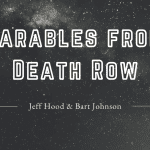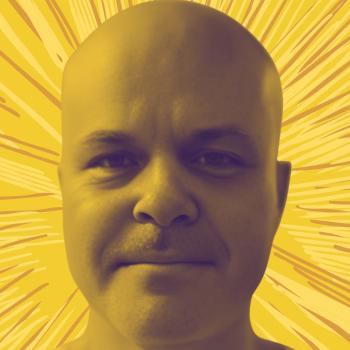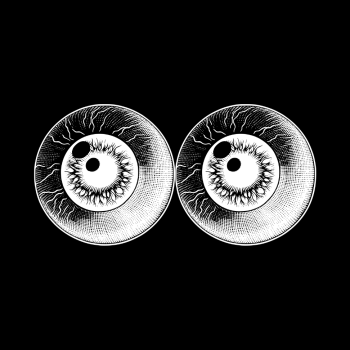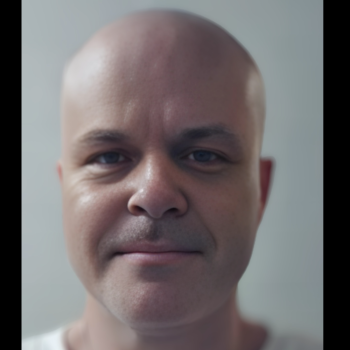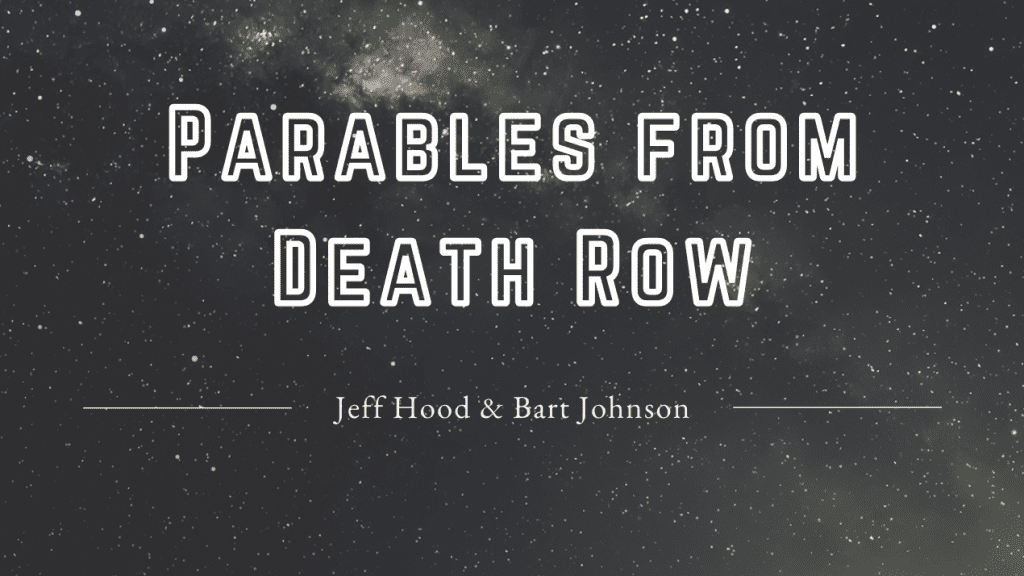
The Good Samaritan & Prodigal Son:
Parables from Death Row: Jeff Hood & Bart Johnson
The Rev. Dr. Jeff Hood, Death Row Spiritual Advisor
Bart Johnson, Prisoner on Alabama’s Death Row
The Good Samaritan
In reply Jesus said: “A man was going down from Jerusalem to Jericho, when he was attacked by robbers. They stripped him of his clothes, beat him and went away, leaving him half dead. A priest happened to be going down the same road, and when he saw the man, he passed by on the other side. So too, a Levite, when he came to the place and saw him, passed by on the other side. But a Samaritan, as he traveled, came where the man was; and when he saw him, he took pity on him. He went to him and bandaged his wounds, pouring on oil and wine. Then he put the man on his own donkey, brought him to an inn and took care of him. The next day he took out two denarii and gave them to the innkeeper. ‘Look after him,’ he said, ‘and when I return, I will reimburse you for any extra expense you may have.’
“Which of these three do you think was a neighbor to the man who fell into the hands of robbers?”
The expert in the law replied, “The one who had mercy on him.”
Jesus told him, “Go and do likewise.”
-Luke 10:30-37, NIV
We are all capable of tremendous good. We are also capable of just walking on by. The world is full of spaces of need. We get opportunities to serve every single day. Why do we more often than not simply walk on by? Why don’t we embrace the good that we all carry? The answer is found in our eyes. Do we have the ability to see…to see the pain in the other? Surely, you can’t respond unless you first see.
Even when we see, we embrace excuses before we embrace the other. How often are we too busy? How often are we too tired? How often do we just not want to be burdened? Our disposition can never dictate our ability to respond to the needs of others. If we allow where we are to dictate what we do, we will never be able to completely see…we will always stumble on our own excuses.
Sometimes we do so much good that we are too busy to do the good that is needed right in front of our eyes. When we spend our time doing good and not seeing needs…we fail at our primary task…presence. If you are doing too much to actually be, you are missing the ability to give the one thing you have to those in need…yourself. Do-gooding creates illusions about what is important. We can’t be so busy chasing good that we miss what is right in front of us. We must be ready to see. Great change can only come through great readiness. Do we live prepared to help?
Of course, the robbers need our help too. Those in need in our midst are not always the most pleasant people to work with. That doesn’t make our call to their needs any less. Those in need must all be our focus…not just those in need that make us comfortable. Where people are and what they have done is a distraction from our responsibility to keep our eyes open to the needs around us.
Don’t be distracted. The juxtaposition of our vision must always be found in serving the needs of those we find abandoned along life’s road. Don’t miss your moment…God is found in such places.
The Prodigal Son
Jesus continued: “There was a man who had two sons. The younger one said to his father, ‘Father, give me my share of the estate.’ So he divided his property between them.
“Not long after that, the younger son got together all he had, set off for a distant country and there squandered his wealth in wild living. After he had spent everything, there was a severe famine in that whole country, and he began to be in need. So he went and hired himself out to a citizen of that country, who sent him to his fields to feed pigs. He longed to fill his stomach with the pods that the pigs were eating, but no one gave him anything.
“When he came to his senses, he said, ‘How many of my father’s hired servants have food to spare, and here I am starving to death! I will set out and go back to my father and say to him: Father, I have sinned against heaven and against you. I am no longer worthy to be called your son; make me like one of your hired servants.’ So he got up and went to his father.
“But while he was still a long way off, his father saw him and was filled with compassion for him; he ran to his son, threw his arms around him and kissed him.
“The son said to him, ‘Father, I have sinned against heaven and against you. I am no longer worthy to be called your son.’
“But the father said to his servants, ‘Quick! Bring the best robe and put it on him. Put a ring on his finger and sandals on his feet. Bring the fattened calf and kill it. Let’s have a feast and celebrate. For this son of mine was dead and is alive again; he was lost and is found.’ So they began to celebrate.
“Meanwhile, the older son was in the field. When he came near the house, he heard music and dancing. So he called one of the servants and asked him what was going on. ‘Your brother has come,’ he replied, ‘and your father has killed the fattened calf because he has him back safe and sound.’
“The older brother became angry and refused to go in. So his father went out and pleaded with him. But he answered his father, ‘Look! All these years I’ve been slaving for you and never disobeyed your orders. Yet you never gave me even a young goat so I could celebrate with my friends. But when this son of yours who has squandered your property with prostitutes comes home, you kill the fattened calf for him!’
“‘My son,’ the father said, ‘you are always with me, and everything I have is yours. But we had to celebrate and be glad, because this brother of yours was dead and is alive again; he was lost and is found.’”
-Luke 15:11-32 NIV
Life has a multiplicity of meanings. Different perspectives flow from different people…and sometimes different perspectives even flow from the same person. Many would like for this parable to have one simple meaning. Of course, that’s absurd. Meaning seems to be coming from every direction.
It’s easy to not like the older son. Let’s face it…he’s unlikeable. He comes across as unbelievably entitled. In the midst of a complicated circumstance, he just sits back and judges everybody else. He’s not the person you’d want to hang out with on the weekend. Church folk seem to act similar. They sit back in all of their self-righteousness…judging everyone who doesn’t live how they live. These folks make it difficult for people to be a part of most churches. The do-gooders often seem to be good at one thing…making sure that other people feel unwelcome. They would rather know it all than actually get to know other people.
The younger son threw everything away. We can all relate to this guy. We’ve all woken up at various points in life…desperate and confused. Most people think that people should just get what they’ve got coming to them…that is unless it’s them. We have no generosity until we need generosity. Why do we function in such ways? We want God to abandon the squanderer…unless we are the squanderer. God loves us how we would want to be loved. God loves us despite what we do. God is always there waiting on us to return.
Returns are not easy. One must have their heart broken once or twice. Regardless of what the story says, the prodigal didn’t return because he was hungry for food…he returned because he was hungry for the embrace of his father. Hope seems to be what he was most hungry for. We can all understand the desire for such restoration…the desire for the open arms. The feast serves as a representation that the open arms offer a more extravagant welcome than we could ever imagine. God doesn’t run out of blessings.
There also seems to be a critique of economic systems buried in there. The distant land is the epitome of greed. It destroys him. He returns of place sustenance or a place that has everything that he needs. Surely, we all want to exist in such a place. So why do we keep going to places of greed? We are so addicted.
Life is complicated. Love is too. Regardless, God always yearns for us to return to the feast.



